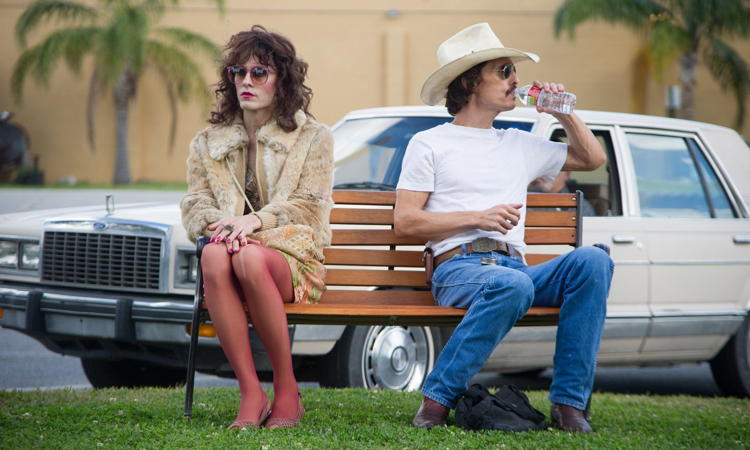By Meredith Alloway · December 5, 2013

When writers adapt epic, true stories, it’s always inspiring. The moment the credits rolled after Dallas Buyers Club, I knew exactly who I wanted to interview. Writing duo Craig Borten and Melisa Wallack delivered one of the bravest scripts of the season.
Directed by Jean-Marc Vallée, the film focuses on the life of AIDS victim Ron Woodruff. Matthew McConaughey, who gives the performance of his career, plays the spitfire Texan. Woodruff goes on to establish the Dallas Buyers Club along with his partner in crime Rayon (Jared Leto), another victim of the epidemic. Despite the tragic situation, the characters and script both remain hopeful.
I got some time to chat with Borten and Wallack to discuss how they took on the massive nonfiction story. They talk the heart of the film and how a partnership, whether as a screenwriter or as Ron and Rayon, can be incredibly powerful.
ATW: What was the biggest hurdle of adapting a true story?
B: I mean I think ultimately you want to service the character in the most truthful way. Also, in this film, there were so many things to tackle- the doctors POV, the FDA’s point of view, the people at the Dallas Buyers Club. You want to service all of them. In a film like this you have to keep it under two hours. You just don’t have the time. Ultimately Melisa and I found what will people connect to and we just found that this unlikely friendship between Ron and Rayon was really what we wanted to service the most. In essence, you’re trying to find the heart. That was the heart.
ATW: Matthew McConaughey is tremendous as Ron. Is there anything he brought out of the script that wasn’t on the page?
W: What we wrote is pretty much on the screen. What surprised us is his ability to transform. He lost a lot of the traditional Matthew McConaughey we know. He was so fully committed that you forget you’re watching Matthew McConaughey!
ATW: How did you keep the story light despite the dark subject matter?
W: We had a lot of conversations about that before we started writing. We both were aware there needs to be levity in the script. You got the sense that [Ron] didn’t wallow in the gravity of the situation. You never had the sense he felt sorry for himself. He was a very amusing person. I think we wanted to be true to that part of his character. It could have been a really intense pity party.
ATW: As you began writing, what did you discover that you didn’t know about the events previously?
W: We knew very little about the AIDS epidemic when we were writing the movie. We weren’t educated into what was going on. The more you try to research the movie, the more to get your arms around. How did AZT get passed? Who was dying of AIDS? Who was being affected? One of the interesting things about Ron, the more his business grew, the more he had more people from all walks of life. You don’t realize that people were not going to the doctor because they knew if they were going to be diagnosed it would be the end of their career, family life.
ATW: Have you uncovered parallels between what was happening in the 1980s and today?
W: I think that that’s what the point of the movie is. It transcends AIDS. I think that the one thing that’s changed a lot is the Internet. Because people now have the ability to go research drugs, side effects. That’s an incredibly liberating tool.
ATW: You all have had a lot of success with this movie! How has the journey been?
W: It’s been an amazing journey, just to have a film made that people accept. We’ve all been on the other side of it.
C: It’s wonderful for people to have a reaction to the film whether it’s positive or negative. We’ve been asked so many wonderful questions. There’s an education going on there. You’re like, ‘Oh, wow. Look at the power of film and story.’
ATW: You guys are a writing duo, which is always a rare and special thing to cultivate. What’s your process? Where did you all write most of the script?
C: I mean we were in a room together most of the time. Sometimes you’re discussing the essence of a scene and sometimes I’m throwing sharp metal objects in a direction! We literally had to go to therapy in the process of this film. It’s one of the most intimate relationships you’ll have with someone without having sex. It’s powerful, you know. Look at what the actors went through for what’s on the page. We have this thing we’d say to Jean-Marc,‘ we had to leave sweat on the page; you’re going to have to leave some blood on the screen. ‘
ATW: Any advice to other aspiring screenwriters out there?
C: My advice is never give up and follow your instincts.
M: Honestly, I think that the most important thing with writing is to make sure you’re always writing. You get caught up in not writing. Write what you know. Everyone always says that but it’s much easier to write what you know.
Dallas Buyers Club is currently out in theaters!